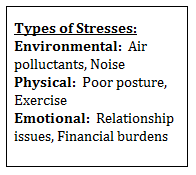We have all experienced short bouts of stress in one way or another, such as being stuck in traffic or increased demands at work. Stress in small doses is normal and healthy because it can motivate ourselves to do our best and allow us to overcome challenges or overwhelming obstacles. Long-term chronic stress, however, can lead to dis-ease resulting in a long list of health problems including hypertension, muscle tissue damage, diabetes, fertility issues, and decreased immunity.

The Effects of Stress on the Body: There are three types of stresses: environmental, physical and emotional. No matter what the cause, your body initially perceives all stress as a “threat”, causing your nervous system to respond. Known as the“fight or flight” response, the sympathetic nervous system (SNS) becomes stimulated; increasing the heart rate, increasing blood flow to the extremities, increasing blood pressure and vision acuity. Stress hormones, such as adrenalin and cortisol are released by the adrenal glands, all of which prepare the body to fight or flee the danger by increasing muscle strength, stamina and heightening the senses.
Chronic high stress, or an overall unhealthy lifestyle, can result in constant stimulation of the SNS and an overactive nervous system. Overproduction of the stress hormones can weaken or exhaust the adrenal glands causing fatigue or the feeling of being “run down”. Disruption of sleep patterns and insomnia can also occur, which are all harmful to our health. Ultimately, adrenal insufficiency can cause chronic fatigue syndrome, thyroid problems, as well as metabolism imbalance and decreased immunity. Additionally, research studies have shown links to high cortisol levels with increased carbohydrate cravings, weight gain and obesity.
Chronic high stress, or an overall unhealthy lifestyle, can result in constant stimulation of the SNS and an overactive nervous system. Overproduction of the stress hormones can weaken or exhaust the adrenal glands causing fatigue or the feeling of being “run down”. Disruption of sleep patterns and insomnia can also occur, which are all harmful to our health. Ultimately, adrenal insufficiency can cause chronic fatigue syndrome, thyroid problems, as well as metabolism imbalance and decreased immunity. Additionally, research studies have shown links to high cortisol levels with increased carbohydrate cravings, weight gain and obesity.

A healthy and balanced spine is the key to coping with stress. Physically, one of the effects of acute and chronic stress is muscle tension or spasm. Muscle tension directly causes misalignments of the spine, known as subluxations. Areas within the spine that are not moving properly may exert pressure on the surrounding nerves, causing irritation or interference, and disrupting the flow of nerve impulses to the organs of the body. Chiropractic treatment focuses on eliminating subluxations by restoring normal movement of the spine, as well as reducing muscle tension and nerve interference. Furthermore, regular adjustments may be enough to turn off the fight or flight response in the body, beginning the process of healing. By correcting the subluxations in the spine, homeostasis, or the state of balance within our body, becomes re-established.
In addition to chiropractic treatment, there are additional recommendations advised by your chiropractor that may help you cope with the stress in your life. Posture recommendations, stretching, yoga, relaxation or meditation techniques are all approved methods of coping with everyday and chronic stress. However, if you are suffering from stress that is unbearable or are experiencing signs of depression, it is important that you take the necessary steps to seek professional help.
For more suggestions on stress relief click here. http://www.acatoday.org/content_css.cfm?CID=2203
In addition to chiropractic treatment, there are additional recommendations advised by your chiropractor that may help you cope with the stress in your life. Posture recommendations, stretching, yoga, relaxation or meditation techniques are all approved methods of coping with everyday and chronic stress. However, if you are suffering from stress that is unbearable or are experiencing signs of depression, it is important that you take the necessary steps to seek professional help.
For more suggestions on stress relief click here. http://www.acatoday.org/content_css.cfm?CID=2203

 RSS Feed
RSS Feed
